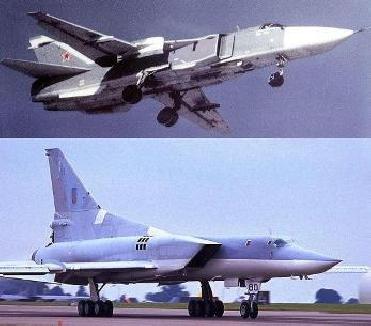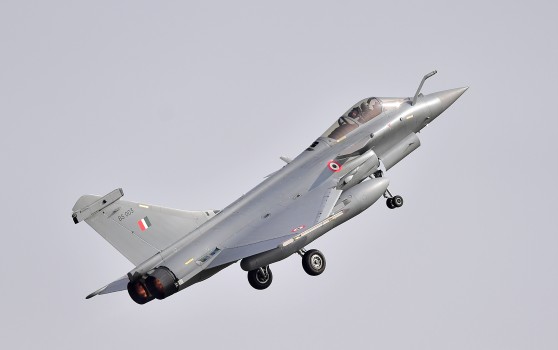
Russian Su-24M 'Fencer' tactical bomber (above),Tu-22M3 'Backfire' strategic bomber. A file photo
Tu-22M3 ‘Backfire’ strategic bomber
The Tupolev Tu-22M (Named 'Backfire' by NATO) is a supersonic, swing-wing, long-range strategic and maritime strike bomber developed by the former Soviet Union.
The first major production version was Tu-22M2 (NATO nick-named 'Backfire-B'), with longer wings and an extensively redesigned, area ruled fuselage, twin NK-22 engines with F-4 Phantom II-style intakes. These were mostly armed with long-range cruise missiles/anti-ship missiles.
The next variant was the Tu-22M3 that carried out its first flight test on June 20, 1977. It began operational evaluation in the late 1970s, and entered service in 1983.
Modifications were done on Tu-22M3 (NATO-named ‘Backfire C’); its nose was lengthened, the air intakes were changed and maximum angle of the swept-variable geometry wings increased up to 65 degrees. Cleared of some of the shortcomings of its predecessors, this aircraft soon proved its worth in service with long-range and naval aviation units.
The range of the bomber was increased to 6,800-km, maximum speed up to 2,300-km/h and the payload was twice that of the Tu-22M2.
The bomber is equipped with a maximum of three Kh-22 cruise missiles or up to 10 Kh-15 (AS-16) short-range missiles. It can also carry nuclear bombs. In 1985, the Tu-22M3 conducted high-speed flight tests at low altitude that demonstrated its capability of countering air defences.
Tu-22M3 is designed to defeat ground and marine targets with supersonic missiles/airbombs day and night in any meteorological conditions. For this purpose, the plane is equipped with high-power onboard electronic equipment including sophisticated radar, optical-electronic bombardement sight OPB-15, inertial navigational system, active and passive systems RLS.
Su-24M ‘Fencer’ tactical bombers
The Su-24M frontline bomber aircraft entered service with the Russian defence forces in 1983. It is a modified variant of Su-24 (codenamed 'Fencer' by NATO).
Su-24M (codenamed ‘Fencer-D’ by NATO) is designed to penetrate hostile territory and destroy ground and surface targets in all weather conditions, by day and night.
The attack aircraft has a conventional aerodynamic configuration with a variable-sweep shoulder wing. The fuselage is of rectangular-section semi-monocoque design, with a two-seat pressurised cockpit. The wing sweepback angle varies from 16 to 69 degrees, with respect to the wing leading edge with four outer-wing panel fixed positions of 16, 35, 45 and 69 degrees.
The tail unit comprises all-moving horizontal tail surfaces and a single-fin vertical tail fitted with a rudder. The horizontal tail surfaces function as an elevator when deflecting symmetrically, and as ailerons when deflecting differentially. Tricycle-type landing gear allows the aircraft to be operated from either concrete or unpaved runways.
The aircraft has nine pylons under fuselage. It contains each wingroot glove and outer wings for guided and unguided air-to-surface weapons, including TN-1000 and TN-1200 nuclear weapons, up to four TV or laser-guided bombs, missiles such as Kh-23 (NATO AS-7 'Kerry'), Kh-25ML (AS-10 'Karen'), Kh-58 (AS-11 'Kilter'), Kh-25MP (AS-12 'Kegler'), Kh-59 (AS-13 'Kingbolt'), Kh-29 (AS-14 'Kedge') and Kh-31A/P (AS-17 'Krypton').
The aircraft is loaded with rockets of 57 mm to 370 mm calibre, bombs (typically 38 x 100 kg FAB-100), 23 mm gun pods or external fuel tanks; two R-60 (AA-8 'Aphid') air-to-air missiles for self-defence. It is also armed with KAB-50OKR TV-guided and KAB-1500L laser-guided air bombs.
- Courtesy:
Global security
Warfare.ru
 Previous Article
Previous Article Next Article
Next Article













The Indian Air Force, in its flight trials evaluation report submitted before the Defence Ministry l..
view articleAn insight into the Medium Multi-Role Combat Aircraft competition...
view articleSky enthusiasts can now spot the International Space Station (ISS) commanded by Indian-American astr..
view article